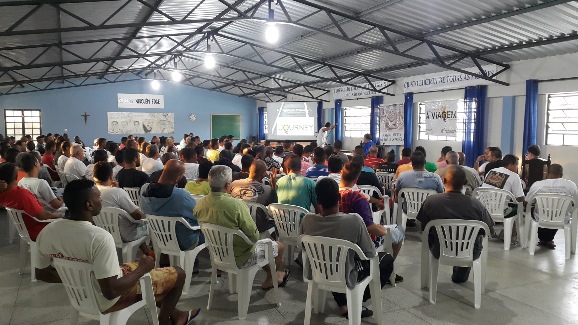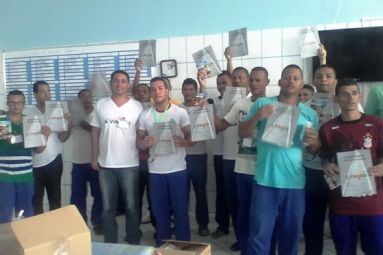- Better Society -
- 4mins -
- 454 views
Discover why this Brazilian prison gives its inmates the keys to their cells
It’s one of 49 privately-run detention centres over five Brazilian states that have proven to be an effective alternative to the state-run prison system at reducing reoffending rates.
Giving inmates responsibility rather than taking it away has improved reoffending rates
One man, Valdeci Ferreira, is part of a long-standing mission to overhaul the way the Brazilian penal system operates. He is director of the a non-governmental, non-profit organisation that oversees a private faith-based and privately-owned prison system: The ‘APAC’ prisons are so radically different to the traditional system that the inmates are even given the keys to their own cells. So far, none have chosen to leave.
Valdeci Ferreira believes everyone is capable of change — given the right opportunities
Brazilian prisons are notoriously horrific. Brutality, endemic violence, riots and severe overcrowding have given Brazil the reputation of having one of the worst penal systems in the world.
For example, in January 2017, a turf war between rival drug gangs left 56 inmates dead. By the first 20 days of that year, 130 prisoners had died as a result of widespread violence.
Sometimes the only way for guards to regain control in a prison riot is to shoot the ringleaders dead.
Brazil’s prison population is close to 700,000, one of the highest in the world, beaten only by the US and China.
Its system is heaving under the pressure of an occupancy rate some 165% higher than its structures allow for. Some cells are packed so tightly that prisoners have no room to lie down.
The reoffending rate of Brazilian prisoners is sky high – around 70%.
Valdeci Ferreira is part of a long-standing mission to change all that. He is director of the Brazilian Fraternity of Assistance to the Convicted (FBAC), a non-governmental, non-profit organisation that oversees a private faith-based and privately-owned prison system: the Association for the Protection and Assistance to the Convicted (APAC).
The APAC prisons are so radically different to the traditional system, that the inmates are given the keys to their own cells. So far, none have abused the trust shown in them.
At the heart the program is the idea that everyone is capable of change – given the right opportunities.
With the keys to the prison in their hands, it’s hard to imagine how the APAC system doesn’t have a problem with escapees.
Ferreira says that, when one prisoner was asked why he did not escape, he replied: "Nobody escapes from love".
Source: WorldEconomicForum

A recuperando‘s day starts at 6am and is organised around work, study and community
“APAC (prisons) in Brazil practice an alternative methodology of incarceration and rehabilitation, humanising the punishment and preparing offenders to re-enter society,” explains Valdeci Ferreira.
An inmate is referred to as a recuperando (recovering person). The day starts at 6am and is organised around work, study and community. It ends at 10pm, and prisoners return to their cells only to sleep. Jobs are diverse – involving crafts, tending the vegetable garden, baking, carpentry, and kitchen work – and are divided among the prisoners.
Under the program prisoners must also study. Some begin the primary education denied to them in their youth, others study at middle school level, or take vocational or university courses.
In their free time, they play sports or participate in creative arts and attend lectures. Religious instruction is given to those who choose to follow it.
APAC prisons are clean and the food is healthy. Everyone is known by name rather than number and there are no drugs or cell phones, and no overcrowding.
Source: WorldEconomicForum

This system works! Recidivism and it’s cost to the public purse is down
With the keys to the prison in their hands, it’s a wonder the APAC system doesn’t have a problem with escapees. But Ferreira reports that, when one prisoner was asked why he did not escape, the inmate replied: "Nobody escapes from love".
“The key is nothing more than a symbol of trust,” he explains. “It shows the human being who made a mistake that someone believes and trusts them again. The recuperando has – quite literally – in his hands and in his mind the power to make decisions and understand the consequences.”
Alongside the structured routine, instilling a sense of responsibility and supporting the prisoners ready for their release are key elements of APAC.
“Helping the recuperando means mutual help and companionship in the prisoner’s journey, something unthinkable in the common system. With this approach, it becomes clearer to understand that they can help each other to not make mistakes, to not make hasty decisions.”
Slowly, the prisoners begin to understand the impact of their crimes, not just on those in the immediate vicinity, but in the entire community.
With vocational and professional training under their belt, a continued relationship with their families – the system also provides support to the families of inmates – as well as legal and health assistance, the prisoners are far more prepared for the outside world.
APAC prisons are showing results that the traditional system can only dream of.
- Recidivism ranges between 7% and 20%.
- The cost to the public purse is one third of that spent in state prisons.
- No weapons, rebellions or acts of violence have ever been recorded in the system’s history.
Source: WorldEconomicForum

